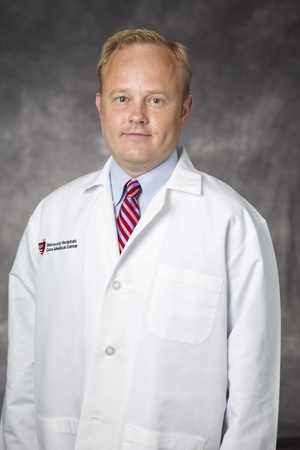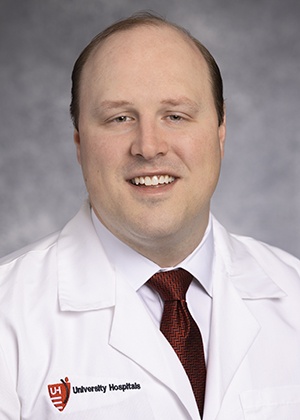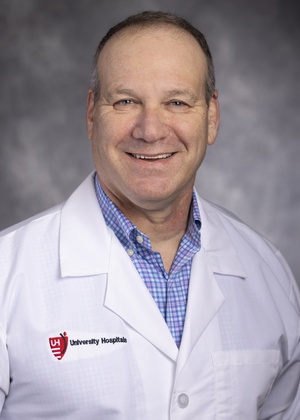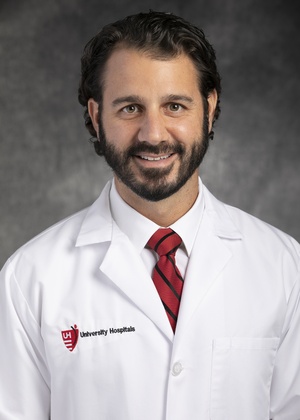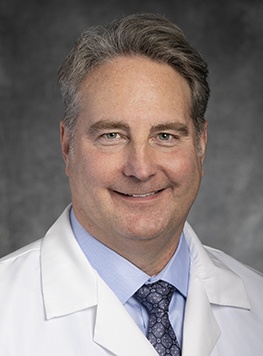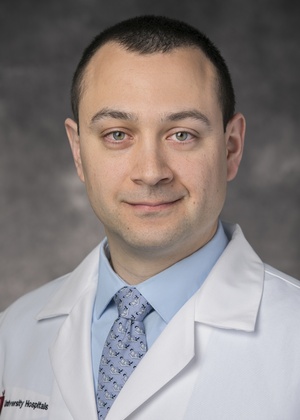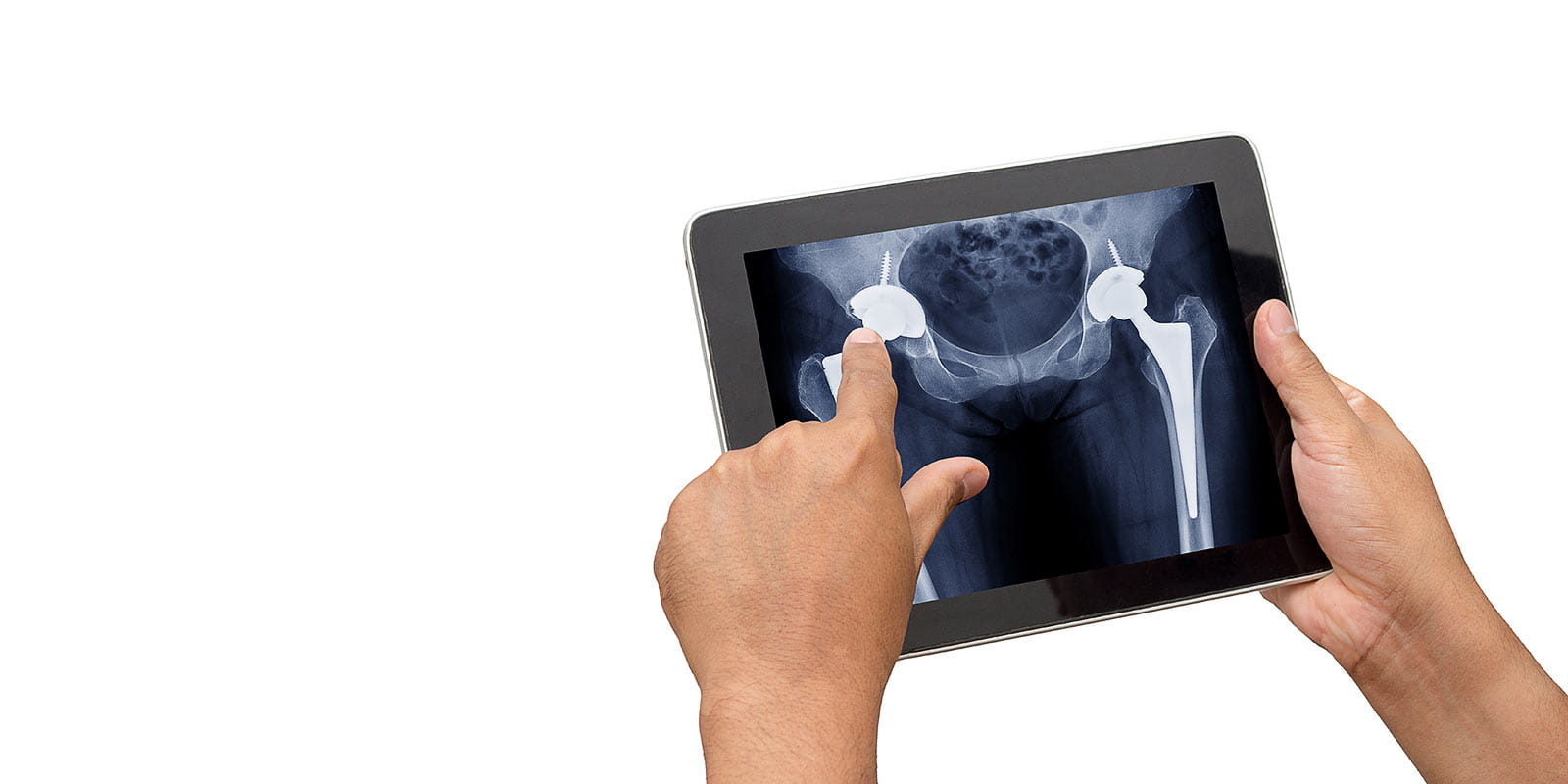
Joint Replacement at University Hospitals
Injuries, conditions such as arthritis, and every day wear and tear can lead to joint pain and stiffness over time. When severe joint pain starts to interfere with your quality of life and is no longer responding to other treatment methods, it may be time to consider joint replacement surgery at University Hospitals.
Find out if joint replacement is right for you
To discuss your options with one of our orthopedic surgeons, call 216-844-7200 to schedule an appointment with one of our orthopedic surgeons to discuss your options.
Expertise in Joint Replacement
During hip or knee replacement surgery, the damaged part of the joint is removed and then replaced with an implant. The procedure significantly decreases pain and improves quality of life. For the majority of people, a total joint replacement will last up to 20 years, and sometimes even longer.
Joint replacement surgery will not be conducted until all possible conservative treatments have been exhausted. These may include physical therapy, anti-inflammatory medications, injections, bracing and weight loss.
University Hospitals orthopedic surgeons were among the first in the world to perform total hip replacement surgery, and today our team continues this tradition of innovative excellence. Our fellowship-trained joint surgeons use the latest technologies and materials for joint replacement procedures, performing advanced arthroscopic, or minimally invasive, joint replacement and robotic and computer-assisted surgery.
Although most joint replacement surgeries will require a short hospital stay, certain patients undergoing hip or knee replacement may be eligible to have their surgery done as an outpatient procedure, meaning they are discharged to recover at home 4 -23 hours after their surgery.
UH is a high-volume joint replacement surgery center, which means more experienced surgeons and better outcomes for patients. Our orthopedic specialists perform thousands of joint replacements each year and we are consistently recognized as one of the best programs in the nation.
How Long Will I Be in the Hospital?
The orthopedic experts at University Hospitals use the latest minimally invasive approaches for joint replacement surgery whenever possible. Some patients, based on a variety of factors, may be eligible for outpatient hip or knee replacement, meaning they are discharged to recover at home 4 -23 hours after their surgery. Others may require a short hospital stay (1 – 4 days) to monitor their recovery, particularly if other medical conditions exist.
Outpatient Total Joint Replacement at University Hospitals
For eligible patients, it is now possible to be discharged from the hospital on the same day of your hip or knee replacement surgery and begin your recovery in the comfort of your own home.
Joint Replacement Procedures
Our board-certified and fellowship-trained orthopedic surgeons have specialized training in knee, hip and shoulder replacement and are experts in performing:
- Total hip replacement (hip arthroplasty)
-
In total hip replacement, also called hip arthroplasty, the surgeon will remove the damaged portions of the hip joint and replace them with an artificial joint, or prosthesis. This artificial joint is usually made of hard and durable materials such as metal, ceramic and plastic.
During hip replacement surgery, your orthopedic surgeon will make an incision in either the front (anterior) or side (posterior) of your hip. After removing the damaged areas but leaving healthy bone intact, they will implant the artificial socket in the pelvic bone and attach the prosthetic ball to the top of your femur (thighbone).
After your surgery, you will likely be up and walking with a cane or walker the same day or the following day. Some people are even able to go home the same day and continue their recovery there. Patients will usually walk with the assistance of a cane for about three weeks post-procedure and are fully functional at three to six months. Physical therapy may or may not be required.
- Partial hip replacement
-
In a partial hip replacement surgery, the surgeon replaces the ball of the hip joint with a prosthesis, but not the socket. This surgery is often done to repair certain types of hip fractures.
- Anterior approach for hip replacement
-
With anterior approach, the surgeon makes the incision for the hip replacement at the front of the hip instead of the side (posterior). This approach allows the surgeon to reach the hip joint by separating the muscles instead of splitting them. This can potentially mean less post-operative pain for the patient. Patients with anterior approach hip replacement are usually up and walking with assistance the same day or the next day after surgery. The recovery time is similar to that of the posterior approach.
- Hip revision surgery
-
A hip revision surgery is the re-operation of a total hip replacement surgery. This may be necessary due to regular wear and tear, damage to the artificial joint, an infection, or recurring dislocation of the hip. A hip prosthesis in general should last 15 to 20 years, so when a younger person has a hip replacement surgery, a revision surgery may be necessary later.
- Total knee replacement (Knee arthroplasty)
-
Total knee replacement – or knee arthroplasty – is a procedure in which the surgeon will resurface the knee joint, cutting away the damaged bone and cartilage and replacing it will an artificial joint, usually made of metal or plastic. The most common reason for knee replacement is to relieve debilitating arthritis pain and improve quality of life.
During total knee replacement surgery, your surgeon will expose the knee joint, move aside the kneecap and remove the damaged portions of the joint. They will then attach the pieces of the prothesis to the bone and test the new joint’s function before closing the incision. The surgery usually lasts about two hours.
Hospital stay length will depend on many factors, but some people are able to go home the same day. You will be able to resume normal daily activities three to six weeks after surgery.
- Partial knee replacement
-
With a partial knee replacement surgery, your surgeon replaces only one part of a damaged knee – the medial (inside), lateral (outside), or the kneecap. A surgeon may use this procedure when arthritis is only present in part of the knee. The damaged portions are replaced with a prosthesis and the rest of the knee joint is preserved.
A partial knee replacement often uses smaller incisions, so recovery time is shorter than with a total knee replacement.
- Shoulder replacement
-
Shoulder replacement surgery is done to relieve pain and other symptoms caused by damage to the shoulder joint. During total shoulder replacement surgery, the ball and socket of the joint are replaced by implants, or metal and plastic prosthetics. With a partial shoulder replacement, only the ball is replaced.
- Reverse shoulder replacement
-
A reverse shoulder replacement transforms the shoulder to allow mobility without a rotator cuff. During the procedure, the ball and socket of the shoulder joint are replaced, but reversed. The ball is attached to the shoulder while the socket is attached to the arm, so that the deltoid muscle is responsible for the shoulder’s mobility instead of the rotator cuff.
Reverse shoulder replacement procedures are often the best option for patients who have both a significant rotator cuff injury and shoulder arthritis. In addition, some patients who’ve had an unsuccessful traditional shoulder replacement may be a good candidate for reverse shoulder replacement.
When Is It Time To Have Hip or Knee Replacement Surgery?
Total knee or hip replacement surgery is a major operation with extensive recovery time. If you've tried non-invasive treatments and still have not found relief, it may be time to talk with your doctor or surgeon about total hip or knee replacement. Your surgeon will thoroughly examine your joint through X-rays and physical testing to determine if replacement is the best option.
The following are common signs that you may be a good candidate for joint replacement:
- Pain during humid or rainy weather
- Trouble sleeping
- Difficulty walking or climbing stairs
- Grinding in your hip or knee joint
- Moderate, but continuous knee or hip pain, day or night
- Severe pain or debilitating stiffness
- Chronic joint inflammation and swelling that doesn't go down with rest or medication
- Inability to perform simple routine tasks
- No pain relief from nonsteroidal anti-inflammatory drugs or an inability to tolerate them
- Discomfort from a previous injury
- How to Prepare for Knee or Hip Replacement Surgery
-
Once your surgeon has determined that you're a good fit for a hip or knee replacement, you will be required to go to medical consultations, physical evaluations and a preop joint replacement class about a month before your operation date. At your consultation, nurses or your surgeon will consult with you about how to prepare for your operation as well as the risks involved with surgery. The following are some general things to do before your surgery date.
- Maintain a healthy diet
- Manage blood glucose if diabetic
- Quit smoking
- Review medications
- Exercise regularly
- Day of Your Surgery
-
The operation itself can take anywhere from 45 minutes to over two hours, depending on the complexity of the surgery. You will usually be under general, spinal or epidural anesthetic. Implants are typically made of chrome and cobalt or titanium as well as a plastic material called polyethylene.
Immediately following your knee or hip replacement surgery, you’ll spend some time in recovery where you’ll be given various painkillers and fluids. You can usually leave the hospital within one to two days. Arrangements will be made for wound care, follow-up appointments and physical therapy.
What to Bring to the Hospital
There are a few items that you’ll want to bring to the hospital to make your brief stay more comfortable. Keep it to necessities and must-have comfort items.
- Undergarments
- Loose clothing
- Loose pajamas or a short nightgown
- Socks
- Closed-heel slippers with rubber soles
- Sneakers or shoes with Velcro or elastic laces
- Eyeglasses (if needed)
- Hearing aid and batteries (if needed)
- CPAP machine, tubing and settings (if needed)
- List of current medications and supplements, noting those which have been stopped prior to surgery (do not bring your own medications)
- Toiletry items, including toothbrush, toothpaste, denture cleanser, razor, shaving cream, brush/comb, deodorant, etc.
- Driver’s license or photo ID
- Insurance card, Medicare or Medicaid card
- Cellphone, smartphone or calling card
- Emergency contacts and the phone number of the person who's bringing you home
- A copy of advanced directives
- Any hand-carry medical equipment you may need (e.g., reachers or a long-handled shoehorn)
- What to Expect After Joint Replacement Surgery
-
Your knee or hip replacement surgery recovery time will depend on your age, general health, muscle strength and the overall condition of your other joints. But there are some things you can do to help aid in your recovery:
- Let your surgeon and nurses know if you’ve had any issues with pain medications in the past.
- Keep drinking fluids. Once you’re drinking enough, your IVs will be removed.
- Keep moving. Immediately after surgery with the assistance of your therapist you will get up to go to the bathroom, get out of bed, etc. As you continue with therapy, your mobility level will increase.
- Utilize the cold packs, wraps and oral pain medication provided to manage pain and reduce swelling.
- Exercise following your physical therapist’s recommendations to improve your mobility. This includes moderate to low-impact exercises like walking, biking and swimming.
- Monitor for signs of infection, blood clotting and pulmonary embolism.
What Not To Do After Joint Replacement Surgery
Most patients can resume normal activities and routines six weeks after surgery, but keep in mind that there may be pain and swelling for up to three months. To lessen the chances of issues and complications, there are a few things you’ll want to avoid for a speedy and successful recovery.
- Don’t pivot or twist the leg that has been operated on.
- Don’t bend down, kneel or squat.
- Don’t lift heavy things.
- Don’t stand for long periods.
- Don’t soak your wound until the scar is healed to avoid infection.
Hip & Knee Care for Athletes
The UH orthopedic specialists have special expertise in caring for hip- and knee-related sports injuries in athletes of all ages and skill levels.
Joint-Preserving Procedures Delay or Eliminate Joint Replacement
If your hip or knee joint pain is minor, joint-preserving procedures may be a first step in delaying joint replacement or even as an alternative to total joint replacement. We offer several joint-preserving procedures, including:
- Joint debridement: This treatment removes bone spurs and damaged tissues around the hip or knee joints that can cause pain.
- Realignment osteotomy: This treatment corrects hip or knee deformities, realigns the abnormal joint and shifts weight to a normal part of the joint.

Benefits of Joint Replacement
- Reduced joint pain
- Increased ability to stand, walk and return to low impact activities like golf, biking, hiking and many other types of exercise
- Improved and more restful sleep
- Improved quality of life
- Increased mobility
- Increased movement and range of motion
- Improved overall joint strength and function
- Improved overall health
Robotic Assisted Technology for Joint Replacement
UH is proud to offer joint replacement using the Mako Robotic Arm. This innovative technology, available at UH Elyria Medical Center, is changing to way joint replacement in delivered and enhancing care for patients. The robotic arm provides surgeons with real-time visualization in order to ensure accurate placement and alignment of the new joint. It also allows for 3-D modeling of the existing joint in order to customize each patient's treatment plan.
Learn more about the Mako Robotic Arm
Meet the UH Joint Replacement Surgeons
Steven Fitzgerald, MD
- Orthopedic Surgery, Orthopedic Adult Reconstructive Surgery
-
Beachwood (5 mi.)
Beachwood (6 mi.)
Mayfield (9 mi.)
Medina (29 mi.)
Stephen Bigach, MD
- Orthopedic Surgery, Orthopedic Adult Reconstructive Surgery
-
Mentor (19 mi.)
Cleveland (0 mi.)
Beachwood (5 mi.)
Stephen Bowen, MD
- Orthopedic Surgery
-
Hudson (22 mi.)
Ravenna (29 mi.)
Wayne Cohen-Levy, MD
- Orthopedic Adult Reconstructive Surgery
-
Mayfield (9 mi.)
Beachwood (5 mi.)
Beachwood (6 mi.)
Mayfield (9 mi.)
Mentor (19 mi.)
Patrick Convery, MD
- Orthopedic Surgery
-
Willoughby (12 mi.)
Mentor (19 mi.)
John Feighan, MD
- Orthopedic Foot and Ankle Surgery, Orthopedic Surgery
-
Independence (8 mi.)
Beachwood (5 mi.)
Brandon Jonard, MD
- Orthopedic Adult Reconstructive Surgery, Orthopedic Oncology, Orthopedic Trauma Surgery
-
Chardon (21 mi.)
Cleveland (0 mi.)
Beachwood (5 mi.)
Westlake (15 mi.)
Hudson (22 mi.)
John Kozy, MD
- Orthopedic Surgery, Orthopedic Adult Reconstructive Surgery
-
Parma (11 mi.)
Westlake (15 mi.)
Westlake (16 mi.)
Robert Leb, MD
- Orthopedic Surgery
-
Ashland (60 mi.)
Jared Levin, MD
- Orthopedic Surgery, Orthopedic Shoulder Surgery, Orthopedic Sports Medicine
-
Broadview Heights (13 mi.)
Beachwood (7 mi.)
Parma (11 mi.)
David Marsh, MD
- Orthopedic Sports Medicine, Orthopedic Shoulder Surgery, Orthopedic Surgery
-
North Olmsted (17 mi.)
Sheffield Village (25 mi.)
Amherst (34 mi.)
Brett McCoy, MD
- Orthopedic Surgery
-
North Olmsted (17 mi.)
Parma (11 mi.)
Broadview Heights (13 mi.)
North Ridgeville (21 mi.)
Sheffield Village (25 mi.)
Amherst (34 mi.)
Mark McElroy, MD
- Orthopedic Surgery
-
Beachwood (5 mi.)
Mayfield (9 mi.)
Mayfield (9 mi.)
George Ochenjele, MD
- Orthopedic Trauma Surgery, Orthopedic Adult Reconstructive Surgery, Orthopedic Surgery
-
Beachwood (5 mi.)
Cleveland (0 mi.)
James Ohliger, MD
- Orthopedic Sports Medicine, Orthopedic Surgery
-
North Ridgeville (21 mi.)
Sheffield Village (25 mi.)
Amherst (34 mi.)
Rikesh Patel, DO
- Orthopedic Surgery, Orthopedic Adult Reconstructive Surgery
-
Streetsboro (23 mi.)
Beachwood (6 mi.)
Twinsburg (16 mi.)
Twinsburg (16 mi.)
Hudson (22 mi.)
Ravenna (29 mi.)
Frank Sabo, MD
- Orthopedic Surgery
-
Sheffield Village (25 mi.)
North Ridgeville (21 mi.)
Amherst (34 mi.)
Jeffrey Shroyer, MD
- Orthopedic Surgery, Orthopedic Sports Medicine
-
Beachwood (5 mi.)
Independence (8 mi.)
Solon (12 mi.)
Benjamin Silver, MD
- Orthopedic Adult Reconstructive Surgery, Orthopedic Surgery
-
Chardon (21 mi.)
Willoughby (12 mi.)
Concord (21 mi.)
William Stanfield, MD
- Orthopedic Surgery, Orthopedic Adult Reconstructive Surgery
-
Sheffield Village (25 mi.)
Amherst (34 mi.)
Breana Siljander, MD
- Orthopedic Adult Reconstructive Surgery, Orthopedic Surgery
-
Mayfield (9 mi.)
Beachwood (6 mi.)
John Sontich, MD
- Orthopedic Trauma Surgery, Orthopedic Adult Reconstructive Surgery, Orthopedic Surgery
-
Beachwood (5 mi.)
Cleveland (0 mi.)
Christopher Tisdel, MD
- Orthopedic Surgery, Orthopedic Foot and Ankle Surgery
-
Streetsboro (23 mi.)
Hudson (22 mi.)
Ravenna (29 mi.)
Daniel Zanotti, MD
- Orthopedic Sports Medicine, Orthopedic Shoulder Surgery, Orthopedic Surgery
-
North Olmsted (17 mi.)
Sheffield Village (25 mi.)
Amherst (34 mi.)
Oberlin (36 mi.)
Robert Zanotti, MD
- Orthopedic Sports Medicine, Orthopedic Shoulder Surgery, Orthopedic Surgery
-
Sheffield Village (25 mi.)
Amherst (34 mi.)
Oberlin (36 mi.)



